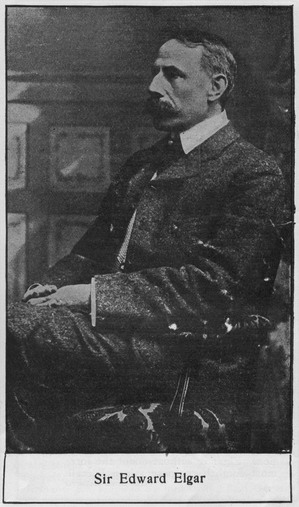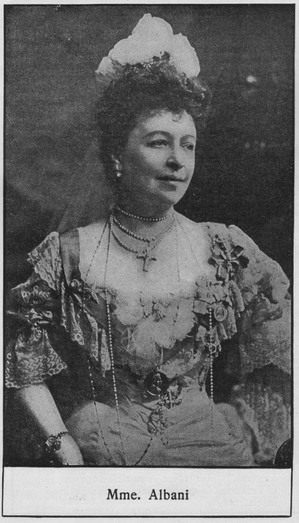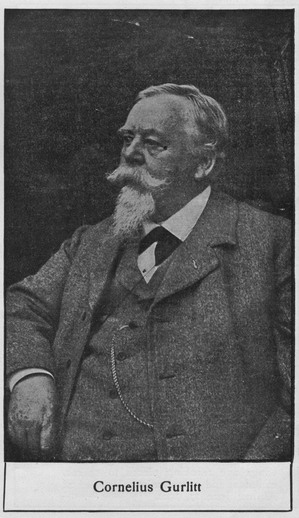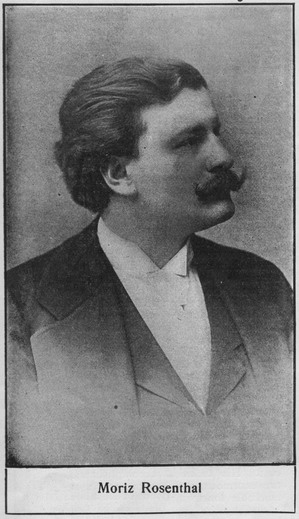 MORIZ ROSENTHAL.
MORIZ ROSENTHAL.
(Ros’-n-tahl.)
Rosenthal was born December 18, 1862, at Lemberg, where his father was professor at the chief academy. At eight years of age he commenced his piano studies under Galoth, who did not pay much attention to technic, but allowed his pupil the greatest freedom in sight- reading, transportation (sic), and modulation. The method is curious, and not to be recommended, though in this case it does not seem to have been harmful. In 1872 he became a pupil of Mikuli, the editor of Chopin, who trained him along more academic lines. On the advice of Joseffy, Rosenthal, still a lad, was sent to Vienna, where he became a pupil of Joseffy, who gave him a thorough grounding in the method of some Liszt and Mendelssohn. A tour Tausig. (sic) A tour through Roumania followed during his fourteenth year. (The preceding 2 sentences are probably supposed to read “On the advice of Joseffy, Rosenthal, still a lad, was sent to Vienna, where he became a pupil of Joseffy, who gave him a thorough grounding in the method of Tausig. A tour followed during his fourteenth year.” -mt) In 1878 Rosenthal became a pupil of Liszt, with whom he studied in Weimar and Rome. As Liszt’s pupil he made his appearance in St. Petersburg, Paris, and elsewhere. His general education, however, was not neglected, and in 1880 Rosenthal qualified to take the philosophical course at the University of Vienna. Six years later he resumed his pianistic career, achieving brilliant success in Leipsic, and subsequently in England in 1895, and later in America, where he has always met with the greatest success. His technical accomplishments are enormous, and he possesses a remarkable touch.
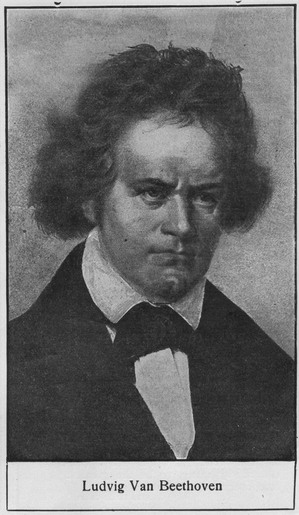 LUDVIG VAN BEETHOVEN.
LUDVIG VAN BEETHOVEN.
(Bay’-to-ven.)
Beethoven was born at Bonn, December 16, 1770. His father was attached to the orchestra of The Elector of Bonn, and proved a strict, even tyrannical, teacher of his son. Beethoven soon became attached to the Elector’s musical household himself, and composed much music. He was further instructed by Pfieffer, Van den Eeden, and Neefe. When on a visit to Vienna in 1787 Beethoven met Mozart, who prophesized that Beethoven would “make a noise in the world some day.” In 1792 Haydn passed through Bonn, and became acquainted with Beethoven’s compositions. It was probably upon the advice of Haydn that Beethoven was sent, by the Elector, to study at Vienna under Haydn. Beethoven and Haydn, however, were not altogether in sympathy, and Beethoven took the opportunity of breaking with Haydn when the latter went to England, and studied under Albrechtsberger. Prince and Princess Lichnowski, came to his assistance when the funds from Bonn ceased, and enabled him to devote himself to composition. In 1820 a disease manifested itself which afterwards developed into total deafness, rendering him taciturn and morose. He died in Vienna, March 26, 1827. His compositions include nine symphonies for orchestra, thirty-eight piano sonatas, and much other chamber and orchestral work. He is considered, by many, to be the greatest composer who ever lived.
Elgar was born at Broadheath, near Worcester, England, June 2, 1857. His father was an organist, and also kept a music store in Worcester. Elgar’s training was almost entirely along self- help lines. He played the organ a little, studied the violin, and several wind instruments, helped at choral societies, conducted a band at a lunatic asylum, and wrote music for every combination of instruments he could think of. He once wrote a whole symphony in the style of Mozart by way of an exercise. In 1889 he married, and went to London. London, however, was not ready for him, and a year later he was glad to return home and become a hum-drum organist. Nevertheless his compositions began to attract attention at the Choral Festivals, “The Saga of King Olaf,” “The Black Knight,” “Banner of St. George,” and other works all fore-shadowed the success which was later to be achieved. The “Enigma” variations for orchestra, given by the Hallé Orchestra under the veteran Dr. Hans Richter, was the first work to attract continental attention. In 1900 came “The Dream of Gerontius,” and this remarkable composition firmly established Elgar’s reputation. “The Apostles” followed, and “The Kingdom,” both part of an oratorial Trilogy, which is not yet complete. The recent production of his first symphony, has once more roused universal attention. Elgar is without doubt the foremost English composer since Purcell.
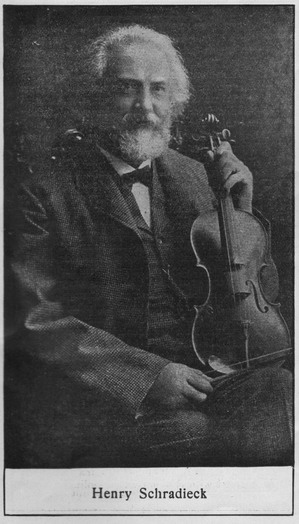 HENRY SCHRADIECK.
HENRY SCHRADIECK.
(Shrad’-eek.)
Schradieck was born at Hamburg, April 29, 1846. He received his first violin lessons from his father, and made his first public appearance at the age of six. He studied under Leonard, in Brussels, where he gained first prize. Afterwards he went to Leipsic, where he became a pupil of David. In 1863 he became a soloist at the Reinthaler concerts at Bremen. The following year he went to Moscow as Professor of the violin. In 1868 Schradieck returned to Hamburg, to take up the position of conductor of the Philharmonic Society, vacated by Auer. After six years he became concert-meister at the Gewandhaus in Leipsic, professor at the conservatory, and leader of the theater orchestra. His reputation as a teacher became very great and his duties very onerous. In need of a complete change, he left Leipsic for Cincinnati, O., where he taught in the College of Music, and also organized an excellent symphony orchestra. In 1889 he took up his old position at Hamburg, besides teaching at the Hamburg Conservatory. Subsequently he returned to America, becoming a teacher in New York, and in Philadelphia. He has written excellent pedagogic material for the violin, in the way of studies, finger exercises, etc., and undoubtedly deserves the reputation he possesses of being one of the foremost violin teachers of the day. He has also interested himself in matters connected with the making of violins.
Albani was born at Chambly, near Montreal, Canada, November 1, 1850, where she received her first instruction in singing at a convent. In 1864 her family removed to Albany, N. Y., where her singing in the cathedral attracted attention. On the advice of the Catholic bishop, her father took her to Paris, where she studied under Duprez. It was Lamperti, of Milan, however, whose instruction was of most value to her. She continued under his guidance until she made her debut in “La Sonnambula” at Messina. From thence she went to the Pergola at Florence. Her Covent Garden debut was made April 2, 1872, again in “La Sonnambula.” In the same year she made a successful appearance at the Italian Opera in Paris. She then returned to Milan, and again underwent a course of training with Lamperti. Albani next went to Russia, and also to America. From 1880 to 1896, except in 1885, she sang each season at Covent Garden. Her repertoire included all the old Italian school, nor was she less successful in the works of Wagner, appearing as Elsa, Elizabeth and Eva in the Italian versions of “Lohengrin,” “Tannhauser,” and “Die Meistersinger.” She has also appeared in oratorio at all the great English Festivals, many works having been specially written for her, such as Gounod’s “Redemption,” and Sullivan’s “Golden Legend.” Her voice is a rich soprano of remarkable quality, very sympathetic in character.
Gurlitt was born at Altona, Prussia, February 10, 1820. For six years he studied under the father of Carl Reinecke, the famous head of the Leipsic Conservatory, with whom Gurlitt was class-mate. His first appearance in public took place during his seventeenth year, and the gratifying reception he obtained determined him to proceed to Copenhagen. Here he studied under Curlander, and Weyse, for organ, piano and composition. Here also he became acquainted with Niels W. Gade, and their friendship terminated only at the death of the Norwegian composer. In 1842 Gurlitt settled in Hirschholm, near Copenhagen, where he resided for four years. From thence he went to Leipsic, where Gade was then musical director to the Gewandhaus concerts. Thence he proceeded to Rome, where his brother, Louis Gurlitt, a well-known painter, was then studying. Cornelius Gurlitt’s merits as a musician were readily recognized in that art centre, and the papal academy “Di Santa Cecilia” nominated him an honorary member, and graduated him “Professor of Music” in 1855. While in Rome he studied painting with excellent results. On his return to Altona, the Duke of Augustenburg engaged him as teacher to three of his daughters, and when the Schleswig-Holstein war broke out, in 1849, Gurlitt became a military bandmaster. His compositions are prodigious in quantity, and range from songs and teaching pieces to operas, cantatas, and symphonies. He died at Altona, June 17, 1901.


